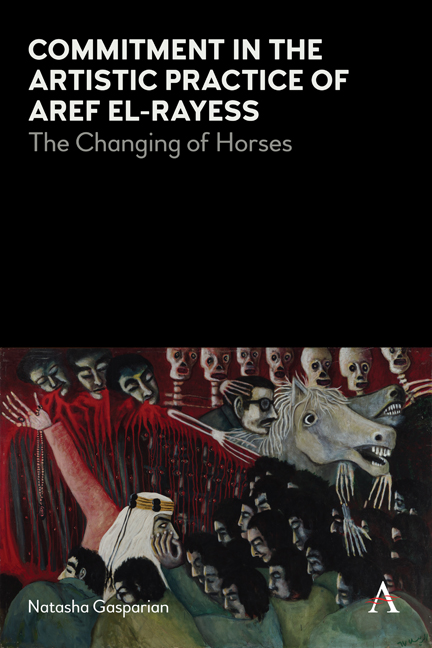Summary
Two months after Blood and Freedom was held in Salle de L’Orient, The Changing of Horses was once again put on public display in a group exhibition, entitled Le 5 Juin, at Dar El-Fan wa-l-Adab (or Dar El-Fan, as it was commonly referred to for short). Held in June 1968 over the duration of six days, Le 5 Juin commemorated the 1967 June War. A widely attended conference was held in tandem, in which Aref El-Rayess declaimed against dealers, collectors and critics in his seminal speech on artistic commitment. The speech, which gained the apt title “The Artist as a Fidaʾi in His Everyday Life” (al-Fannan fi Hayatihi al-Yawmiyya ka Fidaʾi) with its transcription and publication in the daily newspaper al-Muharrir, was the artist's second foray into public discourse—it succeeded the catalog text he wrote for the second iteration of Blood and Freedom in Aley in May 1968—and it exemplified his declarations of artistic and political commitment. He had already argued against the neutrality of a purportedly apolitical position in the catalog text:
To submit to bitter reality is cowardice, and to fail to address and deter evil is to be an accomplice in the crime, and to rush to the armed battlefield with weapons of mercy, forgiveness, love, and faith is foolishness […] [t] o stand cross-armed in the face of the holy duty to go into the battle of honor is more difficult than death.
He rearticulated a version of this statement in his speech for Le 5 Juin, and later reworked and expanded upon other excerpts from his catalog text and his speech in his 1972 political manifesto, “Maʿ Mann wa Dudd Mann?” (With Whom and Against Whom?). These three interventions are each in their own right charged manifestos that share the same diagnosis of a prevailing existential terror. Replete with hyperbolic metaphors, they elaborate a social critique of the current capitalist and colonial material conditions in romantic, anti-capitalist terms. The catalog text and speech also evince an aesthetic commitment to a realist painting that foregrounds humanist content.
In this chapter, I trace the nodal intellectual currents undergirding El-Rayess's proclamations on artistic commitment.
Information
- Type
- Chapter
- Information
- Commitment in the Artistic Practice of Aref El-RayessThe Changing of Horses, pp. 17 - 32Publisher: Anthem PressPrint publication year: 2020
